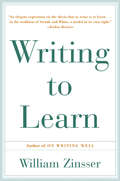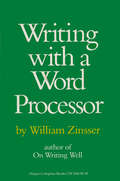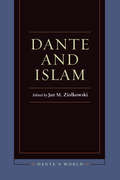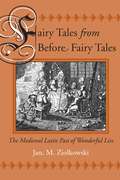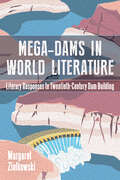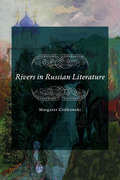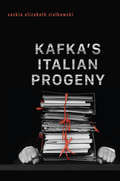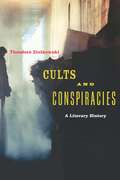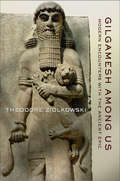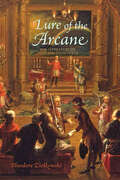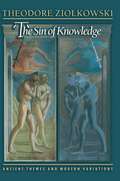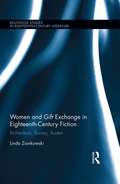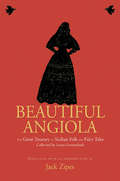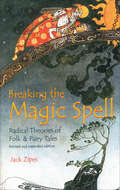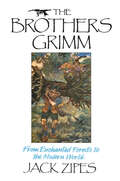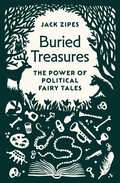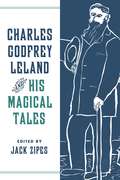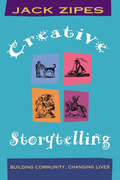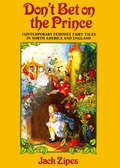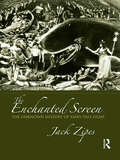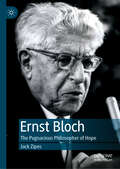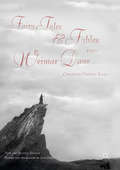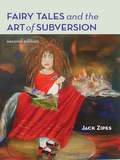- Table View
- List View
Writing to Learn
by William ZinsserThis is an essential book for everyone who wants to write clearly about any subject and use writing as a means of learning.
Writing with a Word Processor
by William ZinsserIn this helpful and entertaining book the author of the classic On Writing Well explains that he has always had a love of paper and a fear of mechanical objects. He describes how he confronted his hang-ups, got a word processor, taught himself to use it and gradually overcame his sense of inferiority to the machine. He explains how the word processor--by enabling him to revise his work instantly on a screen--has changed his lifelong methods of writing, rewriting and editing.But William Zinsser's book isn't only for writers. It's for all the people who have to do any kind of writing--memos, letters, reports, directives--as part of their working day. It explains how the word processor will save time and money in an office or a corporation and predicts that it will soon be our primary writing tool.On one level Writing with a Word Processor is a manual for beginners that describes clearly and simply how to use the new technology. But it is also one writer's story. William Zinsser takes the reader along on a highly personal journey, writing with warmth and humor about his anxieties and fears, his setbacks and triumphs. His book is both an informal guide and an encouraging companion.
Ovid and Hesiod
by Ioannis ZiogasThe influence on Ovid of Hesiod, the most important archaic Greek poet after Homer, has been underestimated. Yet, as this book shows, a profound engagement with Hesiod's themes is central to Ovid's poetic world. As a poet who praised women instead of men and opted for stylistic delicacy instead of epic grandeur, Hesiod is always contrasted with Homer. Ovid revives this epic rivalry by setting the Hesiodic character of his Metamorphoses against the Homeric character of Virgil's Aeneid. Dr Ziogas explores not only Ovid's intertextual engagement with Hesiod's works but also his dialogue with the rich scholarly, philosophical and literary tradition of Hesiodic reception. An important contribution to the study of Ovid and the wider poetry of the Augustan age, the book also forms an excellent case study in how the reception of previous traditions can become the driving force of poetic creation.
Dante and Islam
by Jan M. ZiolkowskiDante put Muhammad in one of the lowest circles of Hell. At the same time, the medieval Christian poet placed several Islamic philosophers much more honorably in Limbo. Furthermore, it has long been suggested that for much of the basic framework of the Divine Comedy Dante was indebted to apocryphal traditions about a “night journey” taken by Muhammad. Dante scholars have increasingly returned to the question of Islam to explore the often surprising encounters among religious traditions that the Middle Ages afforded. This collection of essays works through what was known of the Qur’an and of Islamic philosophy and science in Dante’s day and explores the bases for Dante’s images of Muhammad and Ali. It further compels us to look at key instances of engagement among Muslims, Jews, and Christians.
Fairy Tales from Before Fairy Tales: The Medieval Latin Past of Wonderful Lies
by Jan M. ZiolkowskiWhen did fairy tales begin? What qualifies as a fairy tale? Is a true fairy tale oral or literary? Or is a fairy tale determined not by style but by content? To answer these and other questions, Jan M. Ziolkowski not only provides a comprehensive overview of the theoretical debates about fairy tale origins but includes an extensive discussion of the relationship of the fairy tale to both the written and oral sources. Ziolkowski offers interpretations of a sampling of the tales in order to sketch the complex connections that existed in the Middle Ages between oral folktales and their written equivalents, the variety of uses to which the writers applied the stories, and the diverse relationships between the medieval texts and the expressions of the same tales in the "classic" fairy tale collections of the nineteenth century. In so doing, Ziolkowski explores stories that survive in both versions associated with, on the one hand, such standards of the nineteenth-century fairy tale as the Brothers Grimm, Hans Christian Andersen, and Carlo Collodi and, on the other, medieval Latin, demonstrating that the literary fairy tale owes a great debt to the Latin literature of the medieval period. Jan M. Ziolkowski is the Arthur Kingsley Porter Professor of Medieval Latin at Harvard University.
Mega-Dams in World Literature: Literary Responses to Twentieth-Century Dam Building
by Margaret ZiolkowskiMega-Dams in World Literature reveals the varied effects of large dams on people and their environments as expressed in literary works, focusing on the shifting attitudes toward large dams that emerged over the course of the twentieth century. Margaret Ziolkowski covers the enthusiasm for large-dam construction that took place during the mid-twentieth-century heyday of mega-dams, the increasing number of people displaced by dams, the troubling environmental effects they incur, and the types of destruction and protest to which they may be subject. Using North American, Native American, Russian, Egyptian, Indian, and Chinese novels and poems, Ziolkowski explores the supposed progress that these structures bring. The book asks how the human urge to exploit and control waterways has affected our relationships to nature and the environment and argues that the high modernism of the twentieth century, along with its preoccupation with development, casts the hydroelectric dam as a central symbol of domination over nature and the power of the nation state. Beyond examining the exultation of large dams as symbols of progress, Mega-Dams in World Literature takes a broad international and cultural approach that humanizes and personalizes the major issues associated with large dams through nuanced analyses, paying particular attention to issues engendered by high modernism and settler colonialism. Both general and specialist readers interested in human-environment relationships will enjoy this prescient book.
Rivers in Russian Literature
by Margaret ZiolkowskiRivers in Russian Literature focuses on the Russian literary and folkloric treatment of five rivers—the Dnieper, Volga, Neva, Don, and Angara. Each chapter traces, within a geographical and historical context, the evolution of the literary representation of one river. Imagination may endow a river with aesthetic or spiritual qualities; ethnic, national, or racial associations; or commercial or agricultural symbolism of many kinds. Russian literary responses to these five rivers have much to tell us about the society that produced them as well as the rivers they treat.Distributed for UNIVERSITY OF DELAWARE PRESS
Kafka’s Italian Progeny (Toronto Italian Studies)
by Saskia Elizabeth ZiolkowskiWhile many scholars of world literature view national literary traditions as resolved and stable, Kafka’s Italian Progeny takes the fluid identity of the modern Italian tradition as an opportunity to reconsider its dimensions and influencers. Exploring a distinct but unexamined Kafkan tradition in modern Italian literature, it brings Italian literary works into larger debates and reorients the critical view of the Italian literary landscape. The book calls attention to the way Kafkan themes, narrative strategies, and formal experimentation appear in a range of Italian authors. Offering new perspectives on familiar figures, such as Italo Calvino, Italo Svevo, and Elena Ferrante, it also sheds light on some lesser-known authors, including Tommaso Landolfi, Paola Capriolo, and Lalla Romano. Using diverse approaches to explore thematic, generic, historical, and cultural connections between Kafka’s works and those of Italian authors, the author argues for a new view of Italian literature that includes talking animals, parental bonds, modernist realism, literary detective novels, and lyrical microfiction. Whereas Kafka has been mobilized in discourses on minor and world literature, Kafka’s Italian Progeny investigates the particular nature of the Italian reception of Kafka to reveal the richness and variety of modern Italian literature.
Cults and Conspiracies: A Literary History
by Theodore ZiolkowskiExplore 2,000 years of conspiracy in literature.Outstanding Academic Title, ChoiceHuman beings have believed in conspiracies presumably as long as there have been groups of at least three people in which one was convinced that the other two were plotting against him or her. In that sense one might look back as far as Eve and the serpent to find the world’s first conspiracy. Whereas recent generations have tended to find their conspiracies in politics and government, the past often sought its mysteries in religious cults or associations. In ancient Rome, for example, the senate tried to prohibit the cult of Isis lest its euphoric excesses undermine public morality and political stability. And during the Middle Ages, many rulers feared such powerful and mysterious religious orders as the Knights Templar.Fascination with the arcane is a driving force in this comprehensive survey of conspiracy fiction. Theodore Ziolkowski traces the evolution of cults, orders, lodges, secret societies, and conspiracies through various literary manifestations—drama, romance, epic, novel, opera—down to the thrillers of the twenty-first century. Arguing that the lure of the arcane throughout the ages has remained a constant factor of human fascination, Ziolkowski demonstrates that the content of conspiracy has shifted from religion by way of philosophy and social theory to politics. In the process, he reveals, the underlying mythic pattern was gradually co-opted for the subversive ends of conspiracy.Cults and Conspiracies considers Euripides’s Bacchae, Andreae’s Chymical Wedding, Mozart’s The Magic Flute, and Eco’s Foucault’s Pendulum, among other seminal works. Mimicking the genre’s quest-driven narrative arc, the reader searches for the significance of conspiracy fiction and is rewarded with the author’s cogent reflections in the final chapter. After much investigation, Ziolkowski reinforces Umberto Eco’s notion that the most powerful secret, the magnetic center of conspiracy fiction, is in fact "a secret without content."
Gilgamesh among Us: Modern Encounters with the Ancient Epic
by Theodore ZiolkowskiThe world's oldest work of literature, the Epic of Gilgamesh recounts the adventures of the semimythical Sumerian king of Uruk and his ultimately futile quest for immortality after the death of his friend and companion, Enkidu, a wildman sent by the gods. Gilgamesh was deified by the Sumerians around 2500 BCE, and his tale as we know it today was codified in cuneiform tablets around 1750 BCE and continued to influence ancient cultures—whether in specific incidents like a world-consuming flood or in its quest structure—into Roman times. The epic was, however, largely forgotten, until the cuneiform tablets were rediscovered in 1872 in the British Museum's collection of recently unearthed Mesopotamian artifacts. In the decades that followed its translation into modern languages, the Epic of Gilgamesh has become a point of reference throughout Western culture.In Gilgamesh among Us, Theodore Ziolkowski explores the surprising legacy of the poem and its hero, as well as the epic’s continuing influence in modern letters and arts. This influence extends from Carl Gustav Jung and Rainer Maria Rilke's early embrace of the epic's significance—"Gilgamesh is tremendous!" Rilke wrote to his publisher's wife after reading it—to its appropriation since World War II in contexts as disparate as operas and paintings, the poetry of Charles Olson and Louis Zukofsky, novels by John Gardner and Philip Roth, and episodes of Star Trek: The Next Generation and Xena: Warrior Princess. Ziolkowski sees fascination with Gilgamesh as a reflection of eternal spiritual values—love, friendship, courage, and the fear and acceptance of death. Noted writers, musicians, and artists from Sweden to Spain, from the United States to Australia, have adapted the story in ways that meet the social and artistic trends of the times. The spirit of this capacious hero has absorbed the losses felt in the immediate postwar period and been infused with the excitement and optimism of movements for gay rights, feminism, and environmental consciousness. Gilgamesh is at once a seismograph of shifts in Western history and culture and a testament to the verities and values of the ancient epic.
Lure of the Arcane: The Literature of Cult and Conspiracy
by Theodore ZiolkowskiExplore 2,000 years of conspiracy in fiction.Outstanding Academic Title, ChoiceFascination with the arcane is a driving force in this comprehensive survey of conspiracy fiction. Theodore Ziolkowski traces the evolution of cults, orders, lodges, secret societies, and conspiracies through various literary manifestations—drama, romance, epic, novel, opera—down to the thrillers of the twenty-first century. Lure of the Arcane considers Euripides’s Bacchae, Andreae’s Chymical Wedding, Mozart’s The Magic Flute, and Eco’s Foucault’s Pendulum, among other seminal works. Mimicking the genre’s quest-driven narrative arc, the reader searches for the significance of conspiracy fiction and is rewarded with the author’s cogent reflections in the final chapter. After much investigation, Ziolkowski reinforces Umberto Eco’s notion that the most powerful secret, the magnetic center of conspiracy fiction, is in fact "a secret without content."
Lure of the Arcane: The Literature of Cult and Conspiracy
by Theodore ZiolkowskiA study of the depiction of cults, conspiracies, and secret societies in literature from ancient Greek and Roman mysteries to the 21st century thriller.Fascination with the arcane is a driving force in this comprehensive survey of conspiracy fiction. Theodore Ziolkowski traces the evolution of cults, orders, lodges, secret societies, and conspiracies through various literary manifestations—drama, romance, epic, novel, opera—down to the thrillers of the twenty-first century.Lure of the Arcane considers Euripides’s Bacchae, Andreae’s Chymical Wedding, Mozart’s The Magic Flute, and Eco’s Foucault’s Pendulum, among other seminal works. Mimicking the genre’s quest-driven narrative arc, the reader searches for the significance of conspiracy fiction and is rewarded with the author’s cogent reflections in the final chapter. After much investigation, Ziolkowski reinforces Umberto Eco’s notion that the most powerful secret, the magnetic center of conspiracy fiction, is in fact “a secret without content.”“Conspiracies, whether attributed to mystery cults, Freemasons, Socialists, or Rosicrucians, pervade literature from Euripides to Umberto Eco, as Theodore Ziolkowski shows in Lure of the Arcane. Ziolkowski has read everything, taking even a 3,000-page German novel in his stride, and summarizes and analyses his material fascinatingly for lesser mortals.” —Times Literary Supplement (UK)“Ziolkowski is excellently placed to attempt the construction of a genre history . . . As such, his treatment of the literature and the array of texts included is predictably masterful, moving with ease from Greek and Roman mysteries in antiquity to the Medieval representations of the Knights Templar, through the Rosicrucian manifestoes and the German Enlightenment lodge novels, to the literary depictions of secret societies of Romantic Socialism.” —Nova Religio
The Sin of Knowledge: Ancient Themes and Modern Variations
by Theodore ZiolkowskiAdam, Prometheus, and Faust--their stories were central to the formation of Western consciousness and continue to be timely cautionary tales in an age driven by information and technology. Here Theodore Ziolkowski explores how each myth represents a response on the part of ancient Hebrew, ancient Greek, and sixteenth-century Christian culture to the problem of knowledge, particularly humankind's powerful, perennial, and sometimes unethical desire for it. This book exposes for the first time the similarities underlying these myths as well as their origins in earlier trickster legends, and considers when and why they emerged in their respective societies. It then examines the variations through which the themes have been adapted by modern writers to express their own awareness of the sin of knowledge. Each myth is shown to capture the anxiety of a society when faced with new knowledge that challenges traditional values. Ziolkowski's examples of recent appropriations of the myths are especially provocative. From Voltaire to the present, the Fall of Adam has provided an image for the emergence from childhood innocence into the consciousness of maturity. Prometheus, as the challenger of authority and the initiator of technological evil, yielded an ambivalent model for the socialist imagination of the German Democratic Republic. And finally, an America unsettled by its responsibility for the atomic bomb, and worrying that in its postwar prosperity it had betrayed its values, recognized in Faust the disturbing image of its soul.
Women and Gift Exchange in Eighteenth-Century Fiction: Richardson, Burney, Austen (Routledge Studies in Eighteenth-Century Literature)
by Linda ZionkowskiThis book analyzes why the most influential novelists of the long eighteenth century centered their narratives on the theory and practice of gift exchange. Throughout this period, fundamental shifts in economic theories regarding the sources of individual and national wealth along with transformations in the practices of personal and institutional charity profoundly altered cultural understandings of the gift's rationale, purpose, and function. Drawing on materials such as sermons, conduct books, works of political philosophy, and tracts on social reform, Zionkowski challenges the idea that capitalist discourse was the dominant influence on the development of prose fiction. Instead, by shifting attention to the gift system as it was imagined and enacted in the formative years of the novel, the volume offers an innovative understanding of how the economy of obligation shaped writers' portrayals of class and gender identity, property, and community. Through theoretically-informed readings of Richardson's Clarissa and Sir Charles Grandison, Burney's Cecilia and The Wanderer, and Austen's Mansfield Park and Emma, the book foregrounds the issues of donation, reciprocity, indebtedness, and gratitude as it investigates the conflicts between the market and moral economies and analyzes women's position at the center of these conflicts. As this study reveals, the exchanges that eighteenth-century fiction prescribed for women confirm the continuing power and importance of gift transactions in the midst of an increasingly commercial culture. The volume will be essential reading for scholars of the eighteenth-century novel, economic literary criticism, women and gender studies, and book history.
Beautiful Angiola: The Lost Sicilian Folk and Fairy Tales of Laura Gonzenbach
by Jack ZipesIn one of the most startling literary discoveries of recent years, Jack Zipes has uncovered this neglected treasure trove of Sicilian folk and fairy tales. Like the Grimm brothers before her, Laura Gonzenbach, a talented Swiss-German born in Sicily, set out to gather up the tales told and retold among the peasants. Gonzenbach collected wonderful stories - some on subjects that readers will know from the Grimms or Perrault, some entirely new - and published them in German. Her early death and the destruction of her papers in the Messina earthquake of 1908 only add to the mystery behind her achievement. Beautiful Angiola is an instant classic: a nineteenth-century collection of stories in the great tradition of fairy and folk tales now translated into English for the first time. Gonzenbach delights us with heroines and princes, sorcery and surprise, the deeds of the brave and the treacherous, and the magic of the true storyteller. The Green Bird , The Humiliated Princess , sorfarina , The Magic Cane, the Golden Donkey, and the Little Stick that Hits are titles destine to become new favourites for readers everywhere. Yet while the stories enchant us, the wry taglines with which they often end ('And so they remained rich and consoled, while we keep sitting here and are getting old') gently bring us back to earth.
Breaking the Magic Spell: Radical Theories of Folk & Fairy Tales
by Jack Zipes“Zipes ably demonstrates that moral, political, religious, and other ideologies have shaped these apparently innocent narratives.” —Lore and LanguageThis revised, expanded, and updated edition of the 1979 landmark Breaking the Magic Spell examines the enduring power of fairy tales and the ways they invade our subjective world. In seven provocative essays, Zipes discusses the importance of investigating oral folk tales in their socio-political context and traces their evolution into literary fairy tales, a metamorphosis that often diminished the ideology of the original narrative. Zipes also looks at how folk tales influence our popular beliefs and the ways they have been exploited by a corporate media network intent on regulating the mystical elements of the stories. He examines a range of authors, including the Brothers Grimm, Hans Christian Anderson, Ernst Bloch, Tolkien, Bettelheim, and J.K. Rowling to demonstrate the continuing symbiotic relationship between folklore and literature.“The name Jack Zipes is synonymous with highly regarded and widely read anthologies and critiques of fairy tales.” —Choice“Fairy Tales are a highly fashionable study today for literary scholars as well as folklorists, and another new book shows what a range of interest can be evoked by them. This time in Jack Zipes’ interesting and vigorous study.” —Encounter“Places traditional tales in their socio-political, economic and cultural contexts.” —Teacher Librarian“Zipes reveals the extraordinary breadth of his acquaintance with both recent and classic literature in the field of folk and fairytale research.” —Fabula“Zipes manages the impressive trick of communicating both detail and overview without simplifying either . . . the serious folklorist should definitely have this on his bookshelf.” —Fortean Times
The Brothers Grimm: From Enchanted Forests to the Modern World
by Jack ZipesMost of the fairy tales that we grew up with we know thanks to the Brothers Grimm. Jack Zipes, one of our surest guides through the world of fairy tales and their criticism, takes behind the romantics mythology of the wandering brothers. Bringing to bear his own critical expertise, as well as new biographical information, Zipes examines the interaction between the Grimms' lives and their work. He reveals the Grimms' personal struggle to overcome social prejudice and poverty, as well as their political efforts - as scholars and civil servant - toward unifying the German states. By deftly interweaving the social, political, and personal elements of the lives of the Brothers Grimm, Zipes rescues them from sentimental obscurity. No longer figures in fairy tale, the Brothers Grimm emerge as powerful creators, real men who established the fairy tale as one of our great literary institutions. Part biography, part critical assessment, part social history, the Brothers Grimm provides a complex and very real story about fairy tales and the modern world.
Buried Treasures: The Power of Political Fairy Tales
by Jack ZipesFascinating profiles of modern writers and artists who tapped the political potential of fairy talesJack Zipes has spent decades as a “scholarly scavenger,” discovering forgotten fairy tales in libraries, flea markets, used bookstores, and internet searches, and he has introduced countless readers to these remarkable works and their authors. In Buried Treasures, Zipes describes his special passion for uncovering political fairy tales of the nineteenth and twentieth centuries, offers fascinating profiles of more than a dozen of their writers and illustrators, and shows why they deserve greater attention and appreciation.These writers and artists used their remarkable talents to confront political oppression and economic exploitation by creating alternative, imaginative worlds that test the ethics and morals of the real world and expose hidden truths. Among the figures we meet here are Édouard Laboulaye, a jurist who wrote acute fairy tales about justice; Charles Godfrey Leland, a folklorist who found other worlds in tales of Native Americans, witches, and Roma; Kurt Schwitters, an artist who wrote satirical, antiauthoritarian stories; Mariette Lydis, a painter who depicted lost-and-found souls; Lisa Tetzner, who dramatized exploitation by elites; Felix Salten, who unveiled the real meaning of Bambi’s dangerous life in the forest; and Gianni Rodari, whose work showed just how political and insightful fantasy stories can be.Demonstrating the uncanny power of political fairy tales, Buried Treasures also shows how their fictional realities not only enrich our understanding of the world but even give us tools to help us survive.
Charles Godfrey Leland and His Magical Tales (Series in Fairy-Tale Studies)
by Jack ZipesBorn into a wealthy and privileged family in Philadelphia, Charles Godfrey Leland (1824–1903) showed a clear interest in the supernatural and occult literature during his youth. Legend has it that, soon after his birth, an old Dutch nurse carried him up to the garret of the house and performed a ritual to guarantee that Leland would be fortunate in his life and eventually become a scholar and a wizard. Whether or not this incident ever occurred, we do know that his interest in fairy tales, folklore, and the supernatural would eventually lead him to a life of travel and documentation of the stories of numerous groups across the United States and Europe. Jack Zipes selected the tales in Charles Godfrey Leland and His Magical Talesfrom five different books— The Algonquin Legends (1884), Legends of Florence (1895–96), The Unpublished Letters of Virgil (1901), The English Gypsies (1882), and Gypsy Sorcery and Fortune-Telling (1891)—and has arranged them thematically. Though these tales cannot be considered authentic folk tales—not written verbatim from the lips of Romani, Native Americans, or other sources of the tales—they are highly significant because of their historical and cultural value. Like most of the aspiring American folklorists of his time, who were mainly all white, male, and from the middle classes, Leland recorded these tales in personal encounters with his informants or collected them from friends and acquaintances, before grooming them for publication so that they became translations of the original narratives. What distinguishes Leland from the major folklorists of the nineteenth century is his literary embellishment to represent his particular regard for their poetry, purity, and history. Readers with an interest in folklore, oral tradition, and nineteenth-century literature will value this curated and annotated glimpse into a breadth of work.
Creative Storytelling: Building Community/Changing Lives
by Jack ZipesJack Zipes has reinvigorated storytelling as a successful and engaging tool for teachers and professional storytellers. Encouraging storytellers, librarians, and schoolteachers to be active in this magical process, Zipes proposes an interactive storytelling that creates and strengthens a sense of community for students, teachers and parents while extolling storytelling as animation, subversion, and self-discovery.
Don't Bet on the Prince: Contemporary Feminist Fairy Tales in North America and England
by Jack ZipesFirst published in 1987. Routledge is an imprint of Taylor & Francis, an informa company.
The Enchanted Screen: The Unknown History of Fairy-Tale Films
by Jack ZipesThe Enchanted Screen: The Unknown History of Fairy-Tale Films offers readers a long overdue, comprehensive look at the rich history of fairy tales and their influence on film, complete with the inclusion of an extensive filmography compiled by the author. With this book, Jack Zipes not only looks at the extensive, illustrious life of fairy tales and cinema, but he also reminds us that, decades before Walt Disney made his mark on the genre, fairy tales were central to the birth of cinema as a medium, as they offered cheap, copyright-free material that could easily engage audiences not only though their familiarity but also through their dazzling special effects. Since the story of fairy tales on film stretches far beyond Disney, this book, therefore, discusses a broad range of films silent, English and non-English, animation, live-action, puppetry, woodcut, montage (Jim Henson), cartoon, and digital. Zipes, thus, gives his readers an in depth look into the special relationship between fairy tales and cinema, and guides us through this vast array of films by tracing the adaptations of major fairy tales like "Little Red Riding Hood," "Cinderella," "Snow White," "Peter Pan," and many more, from their earliest cinematic appearances to today. Full of insight into some of our most beloved films and stories, and boldly illustrated with numerous film stills, The Enchanted Screen, is essential reading for film buffs and fans of the fairy tale alike.
Ernst Bloch: The Pugnacious Philosopher of Hope
by Jack ZipesThis book provides a comprehensive introduction to and overview of the life and philosophy of Ernst Bloch. Bloch has had a strange fate in the English-speaking world. He wrote his famous three-volume opus, The Principle of Hope, while living in exile in the United States from 1938 to 1940. It was first published, however, in East Germany in the 1950s after he had returned to Europe and became a professor of philosophy at the University of Leipzig. Gradually, his other numerous works became better known and widespread in Europe and scholars in the US and UK started to take note of his works. Yet, he has still remained a somewhat neglected figure in the humanities. While this book does not set out to entirely rectify this neglect, it does offer readers an introduction to Bloch’s works and the opportunity to understand more about the importance of utopian thought. Through an exploration of some of Bloch’s more controversial communist leanings and relationship to the Soviet Union, a study of Bloch’s utopian quest, and even a comparison with J. R. R. Tolkien, this comprehensive study demonstrates just how interesting a figure Ernst Bloch really was, and how his philosophy of hope has laid the basis for secular humanism.
Fairy Tales and Fables from Weimar Days
by Jack ZipesThis book is a collection of traditional German fairy tales and fables, deliberately transformed into utopian narratives and social commentary by political activists in the Weimar Republic (1919-1933). Against a backdrop of financial and political instability, widespread homelessness, and the reformation of public institutions, numerous gifted writers such as Berta Lask, Kurt Schwitters, Hermynia zur Mühlen, Oskar Maria Graf, Bruno Schönlank, and Joachim Ringelnatz responded to the need for hope among the common people by creating fairy tales and fables that offered a new and critical vision of social conditions. Though many of their tales deal with the grim situation of common people and their apparent helplessness, they are founded on the principle of hope. This revised edition includes over 50 illustrations by contemporary international artists who reveal how similar the Weimar conditions were to the conditions in which we presently live. In this respect, the Weimar fairy tales and fables have not lost their spirit and significance.
Fairy Tales and the Art of Subversion: The Classical Genre For Children And The Process Of Civilization (Routledge Classics Ser.)
by Jack ZipesThe fairy tale may be one of the most important cultural and social influences on children's lives. But until Fairy Tales and the Art of Subversion, little attention had been paid to the ways in which the writers and collectors of tales used traditional forms and genres in order to shape children's lives – their behavior, values, and relationship to society. As Jack Zipes convincingly shows, fairy tales have always been a powerful discourse, capable of being used to shape or destabilize attitudes and behavior within culture.For this new edition, the author has revised the work throughout and added a new introduction bringing this classic title up to date.
